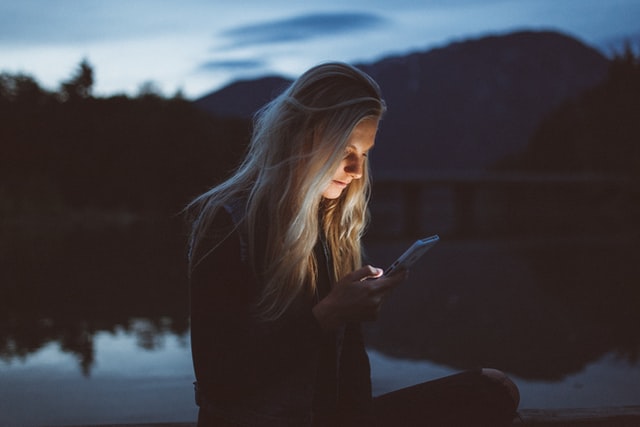Recently, I found myself feeling more stressed and overwhelmed than usual. Many of the contributing factors were out of my control—an increased workload, some big life changes, and other external forces. But one force that I noticed was exacerbating my already anxious state was my interaction with the digital world.

When we are feeling stressed, it can seem like an easy escape to get lost in digital media. During a particularly challenging day, I find myself grabbing for my phone and seeking a momentary distraction only to end up getting sucked in and losing focus on what I need to accomplish. I’ll start scrolling endlessly through social media, checking my email every five minutes, or playing phone games to find an escape from reality.
But those distractions only ever leave me feeling more stressed when I’m done with them, after I realize how unproductive I’ve been. And it’s not only a productivity issue—a lot of what’s out there in the digital world is designed to create a sense of anxiety so we feel compelled to keep clicking, scrolling, and going down the rabbit hole. I found myself interacting with the digital world in an increasingly unhealthy way, from falling for clickbait articles with alarmist headlines to clicking on ads telling me I needed to buy something to fill a void in my life. The more I consumed, the more unfulfilled I felt. It was time to revaluate my relationship with the digital world.
Here are some strategies that enabled me to begin using technology to enhance rather than diminish my focus, productivity, organization, and personal growth.
Declutter Your Email
I’ll admit it—I used to let my email inbox get completely out of control, amassing thousands of unread emails but not bothering to go back and clear out the clutter. I finally committed to keeping a clean, organized inbox. It helps me feel like have my life together in some small way.
To accomplish this, I organized the emails I wanted to keep into clearly labeled folders (recipes, financial documents, wish-list items, etc.) and got rid of all the ones I’d let sit for too long. I also unsubscribed from email lists I was no longer interested in. I learned that in Outlook email, using the Sweep feature, you can set rules for how you want mail from certain senders handled, which is a great way to keep your emails from piling up. For some senders, I have it set for Outlook to keep the latest message and delete the rest from that sender. For others, Outlook automatically deletes all messages more than 10 days old. This helps keep my inbox clutter-free without much recurring effort on my part.
Limit Notifications
Getting notifications on your phone all day can be a huge distractor and stressor. It can be a good idea to mute your text message threads while you are working to ensure you don’t have messages popping up that could divert your attention from the task at hand. I also recommend going into your phone’s settings and turning off notifications for your apps, leaving only those that provide important reminders and help you to be productive.
Reform Your Relationship with Social Media
When we experienced the worldwide social media outage in early October, it made me realize just how addicted I’d been to checking my social apps and getting sucked into meaningless digital distraction. It inspired me to spend a week off of social media—not just to see if I could, but because I knew at least part of my increased anxiety stemmed from constant comparison to other people’s perfect versions of themselves displayed on the internet. I deleted all social apps off my phone and, at first, just like during the outage, I felt a little uneasy not being able to check the latest updates. I had to go through a bit of a withdrawal process while my brain became unwired from the habit of seeking constant stimulation from my phone. But within hours I already started feeling a significant improvement in my mental health.
After a while, though, I realized there were some aspects of being on social media that I missed. I follow some accounts and belong to some social media groups that provide education, a sense of connection, or some other benefit that I wouldn’t want to give up permanently. I concluded that if I wasn’t going to give up social media completely long-term, I needed to be more mindful of what I was using it for and how I spent my time on it. Now that my hiatus is over, I’m making sure to spend most of my time engaging with worthwhile content and scrolling past or unfollowing accounts that don’t add value or elicit joy.
Utilize Digital Productivity and Organization Tools
While the internet is full of distractions that might keep you from being productive, it is also home to many tools designed to help enhance rather than inhibit productivity and organization. With that in mind, spending less time in the digital world isn’t always the answer. The answer may be to reevaluate how your time on the internet is spent and to take advantage of digital tools that can benefit your life.
For example, the collaborative calendar app TimeTree has helped me and my fiancé immensely when it comes to planning together and staying in the know about each other’s schedules. Apps like Todoist and Evernote are great options if you need help with do-to lists, notetaking, and organizing personal or professional projects. YNAB (You Need a Budget) is a handy tool for those seeking a structured plan for creating a budget and saving money. These are just a few of the many resources that can help you transition from digitally distracted to digitally empowered.
Replace Negative Distractions with Positive Ones
There is nothing wrong with having a few apps on your phone that are pure fun—we all need to unwind and decompress sometimes! But if your goal is to improve your focus and productivity, it’s best to limit the “just for fun” distractions and replace them with ones that add value to your life in some way. For instance, I opted to delete most of my mindless phone games and instead spend time on apps that are both fun and educational.
One of them is Lucid, an app that offers overviews of complex topics alongside engaging visuals intended to help you remember the key takeaways and retain what you’ve learned. Another is Grasshopper, an app that teaches coding skills through fun, interactive puzzles. I’m also a big fan of taking free courses on Coursera to learn about new subjects, so I keep the app on my phone and work my way through lessons when I have free time. Some other great apps that promote learning are DuoLingo, Blinkist, Khan Academy, and edX. I challenge you to go through your phone, delete one app that causes negative distraction, and replace it with one of these positive distractions instead.
Commit to Periodic Digital Detoxes
There can be a massive benefit to detoxing from digital media completely, even if it’s only for a short period of time a few times a year. Maybe you’ll go off the digital grid for a few days at the start of every change in season, or maybe you can commit to one detox day a month. If you can’t detach from the internet completely because of work or other commitments, maybe you can give up one small piece of it and redirect that energy elsewhere, like into spending time with loved ones, reading a hard-copy book, meditating, volunteering, or being in nature. Whatever this looks like for you, it’s a positive thing!

Because we spend so much time on the internet, it may seem like a challenge to master interacting with it in mostly positive ways. Being mindful of our digital activity is key. Check in with yourself periodically to evaluate how your relationship with the digital world is affecting you, and make changes as needed. These simple shifts can result in improved mental health and go a long way toward helping you better your life.
Also by Courtney: Vegan German Beer Cheese Soup
Get more like this—Sign up for our daily inspirational newsletter for exclusive content!
___
Photo: Becca Tapert and Ben White via Unsplash




